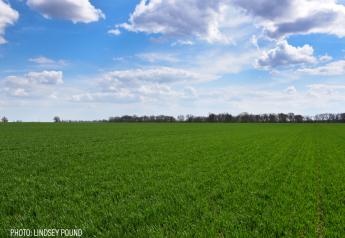Evening Report | October 4, 2022

Click here to view weekly Commitments of Traders charts.
Check our advice monitor on ProFarmer.com for updates to our marketing plan.
Cotton hedgers: Claim profits on 2022-crop hedges… December cotton futures stopped just shy of the July low yesterday, creating a double-bottom on the daily chart, and are posting strong gains today. While the sharp downtrend from late August remains intact, price action early this week suggests additional near-term corrective gains are possible. We advise cotton hedgers to claim profits on the 30% 2022-crop hedges in December futures. Our exit was at 88.12 cents for a 11.46-cent profit.
We would likely reenter hedges if double-bottom support is violated.
SCOTUS WOTUS update... Lawyers yesterday tried to challenge the scope of the Clean Water Act, which could limit how much EPA can protect U.S. waterways. Several Supreme Court (SCOTUS) justices appeared ready to reject a key argument put forward by an Idaho couple behind the lawsuit. And the court’s liberals sought a compromise that would retain the government’s authority to regulate wetlands adjacent to lakes, rivers and other waterways.
If the court sides with the Idaho property owners, environmental advocates say about half of all wetlands and roughly 60% of streams would no longer be federally protected. “This case is going to be important for wetlands throughout the country, and we have to get it right,” Justice Brett Kavanaugh said during the nearly two-hour argument on the opening day of the court’s term. SCOTUS last term restricted the EPA’s authority to curb emissions from power plants.
A key question in the Sackett v. Environmental Protection Agency case is how to determine how far from the water’s edge the Clean Water Act applies. The court failed to reach consensus in a 2006 case, Rapanos v. United States. The 9th Circuit relied on the test put forward by Justice Anthony Kennedy, who provided the deciding vote in that case and said the wetland must have a “significant nexus” to regulated waters. Kennedy, now retired, watched the argument from the front row of the courtroom on Monday, the Washington Post reported.
The Sacketts’ attorney Damien M. Schiff asked the court to embrace the narrow interpretation proposed by Justice Antonin Scalia, the late conservative. Scalia’s definition limits regulation to wetlands with a direct “continuous surface connection” to “navigable waters.” Schiff said a wetland can be regulated only “to the extent that it blends into and thus becomes indistinguishable from an abutting water” and that the physical connection is essential.
Justices Elena Kagan and Sonia Sotomayor pressed lawyers on both sides about the possibility of a new test for figuring out which wetlands are covered. “As you can probably tell, some of my colleagues are dubious that this is a precise enough definition of adjacency to survive,” Sotomayor told the government’s lawyer. “Is there another test that could be more precise and less open-ended?”
By the end of the year, the Biden administration is expected to issue new rules that Fletcher told the court will “provide greater clarity to the regulated public on all parts of the test.”
Bottom line: While the court did not signal a clear outcome during its questioning, the current court has a history of looking skeptically at the federal government’s claim of regulatory authority over the environment when its powers are not clearly defined by law. The three most conservative justices seemed to want to pare back the government’s environmental authority, while the court’s three more liberal members appeared to favor an expansive view. Some of the other justices sent mixed signals.
Here’s what one ag industry lawyer told Pro Farmer: “The Supreme Court will rule against EPA and for the plaintiffs. The case reminds me of Rapanos. In that case, with similar facts, Scalia, Thomas, Alito, and Roberts ruled that such an attenuated connection to a navigable interstate water was insufficient to be covered by the Clean Water Act. It was due to Kennedy’s concurring opinion that we got the confused mess. He wrote about EPA being able to demonstrate a significant nexus between some remote water and a water clearly within the reach of the CWA. Hence the Obama and Biden administrations have sought to implement regs that meet that test, a test by the way that most appellate courts adopted because there was no clear annunciation from the high court. I believe six of the current justices will want to finally provide clarity and stick to what the law allows. Navigable and interstate waters and immediately adjacent wetlands.”
U.S. sees no signs of Russian nuclear movement... A senior Pentagon official said on Tuesday she had no information to corroborate reports suggesting Russia might be moving tactical nuclear weapons by rail, and added the U.S. military had not seen anything to change its own nuclear posture.
“I don’t have anything else but the open source reports,” said Laura Cooper, a deputy assistant secretary of defense focusing on Russia and Ukraine.
There were reports Russian President Vladimir Putin had sent a nuclear military train to Ukraine. The reports said the supply vehicle operated by Moscow’s secretive nuclear division was spotted in central Russia en route to the front line.
The Pentagon closely monitors Russia’s nuclear forces, a core part of its mission since the Cold War.
SovEcon raises Russian wheat export forecast... Consultancy SovEcon raised its 2022-23 Russian wheat export forecast by 300,000 MT to a record 43.4 MMT. Russian milling wheat has regained its competitive edge in recent weeks amid a rally in global prices, though exports are still hindered by the strong ruble and Russia’s export tax.
Andrey Sizov, head of SovEcon, said: “Despite a slow start we still expect Russia to reach record-high exports in the current season, which could resemble 2017-18. The start of the export season back then was the slowest in many years but at the end the volume reached a record-high 41.0 MMT.”
Farmer sentiment fades in September... The Purdue University/CME Group Ag Economy Barometer farmer sentiment index declined 5 points to a reading of 112 in September, driven primarily by producers’ weakened perception of current conditions. The Current Conditions Index declined 9 points to 109. The Index of Future Expectations dropped 3 points to a reading of 113.
“Concerns about input costs and, in some cases, availability are key factors behind the relative weakness in this month’s farmer sentiment,” said James Mintert, the barometer’s principal investigator and director of Purdue University’s Center for Commercial Agriculture. “However, a growing number of producers are also concerned about the impact of rising interest rates on their farm operations.”
The Farm Capital Investment Index declined to a record low of 31 in September, as producers continue to indicate now is not a “good time” to make large investments in their farming operations. For the third month in a row, producers overwhelmingly (46%) said it was due to increasing prices for farm machinery and new construction, however, 21% indicated that “rising interest rates” were a primary reason, up from 14% in August.
White House rules out banning natural gas exports... The White House has now ruled out putting any limits on exports of natural gas in a bid to help alleviate energy shortages in Europe, Reuters reported, based on statements from White House officials. An analysis conducted in the White House on potentially limiting energy exports to ease consumer prices found such an action would be too extreme and could negatively affect key relationships with European countries that are grappling with replacing energy supplies from Russia.
JBS to shutter U.S. plant-based foods business... JBS announced it would be closing Planterra Foods, its U.S. plant-based foods business, but will continue its efforts in other markets relative to plant-based foods. “JBS USA has made the decision to discontinue operations in its U.S.-based Planterra business unit,” JBS USA said in a statement. “We continue to believe in the potential of plant-based options for consumers and remain committed to the alternative-protein market.” The company launched its Ozo brand in 2020, but sales have failed to live up to expectations. “JBS will focus its efforts on its plant-based operations in Brazil and Europe, which continue to gain market share and expand their respective customer bases,” the firm said.






